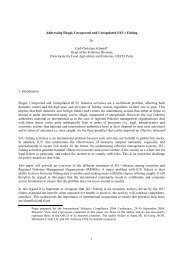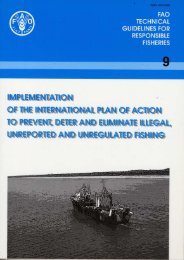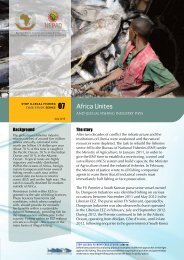Pirate Fish on Your Plate - International MCS Network
Pirate Fish on Your Plate - International MCS Network
Pirate Fish on Your Plate - International MCS Network
You also want an ePaper? Increase the reach of your titles
YUMPU automatically turns print PDFs into web optimized ePapers that Google loves.
Illegal, unreported and unregulated (IUU) or ‘pirate’ fishing has been implicated as <strong>on</strong>e of the most<br />
serious threats to the future of world fisheries. Occurring in virtually all fishing grounds, pirate fishing is<br />
widely believed to account for a significant proporti<strong>on</strong> of global catches. This report reveals the links<br />
between illegal, unreported and unregulated (IUU) fishing vessels operating off the coast of West Africa,<br />
the Spanish ‘port of c<strong>on</strong>venience’ Las Palmas in the Canary Islands, and c<strong>on</strong>sumers and retailers in the<br />
UK. It details the illegal operati<strong>on</strong>s at sea, and the laundering process which enables IUU vessels to sell<br />
their catch in Europe, in the absence of oversight or checks as to the provenance and legality of the fish.<br />
• The Envir<strong>on</strong>mental Justice Foundati<strong>on</strong>’s (EJF) investigati<strong>on</strong>s<br />
focussed <strong>on</strong> suppliers such as L<strong>on</strong>d<strong>on</strong>’s Billingsgate fish<br />
market, where we found two of the snapper species<br />
comm<strong>on</strong>ly known as Dent<strong>on</strong> marked as coming from FAO<br />
Statistical Area 34 (West Africa). Sold under the generic name<br />
“snapper” or occasi<strong>on</strong>ally “sea bream” in the UK, Dent<strong>on</strong> is<br />
caught incidentally by shrimp trawl fisheries: <strong>on</strong>e of the<br />
most ecologically destructive and wasteful tropical fisheries<br />
due to the indiscriminate capture of n<strong>on</strong>-target species in<br />
the trawl nets.<br />
• EJF identified a number of boxes of Dent<strong>on</strong> carrying the logo<br />
of CNFC, a state-owned Chinese company that owns many<br />
of the IUU vessels operating in Guinea. Identical boxes were<br />
seen in three locati<strong>on</strong>s during the course of our investigati<strong>on</strong>s<br />
– <strong>on</strong> board IUU vessels in West Africa, in the notorious<br />
“Port of C<strong>on</strong>venience” Las Palmas in the Canary Islands,<br />
and finally in the UK marketplace.<br />
• The process of laundering illegal fish into the EU marketplace<br />
makes tracing IUU fish virtually impossible. However while<br />
it isn’t possible to definitively prove that the fish within the<br />
boxes discovered by EJF are IUU-caught, our investigati<strong>on</strong>s<br />
show that there is str<strong>on</strong>g evidence linking them to IUU vessels,<br />
and to assert that IUU-caught fish is entering Europe, and<br />
being sold in the UK.<br />
• One of the countries worst-affected by IUU fishing is Guinea<br />
in West Africa. In 2004/05, EJF investigators c<strong>on</strong>ducted field<br />
interviews with communities and enforcement authorities<br />
who all c<strong>on</strong>firmed that IUU fishing is a significant and growing<br />
problem. In 2006, EJF returned to Guinea in partnership with<br />
Greenpeace Internati<strong>on</strong>al to investigate the extent and impact<br />
of IUU fishing. During the course of this investigati<strong>on</strong> we<br />
observed 104 vessels, over half of which (53) were either<br />
engaged in, or linked to, IUU fishing activities.<br />
• Under EU law, individual vessels from third-party countries<br />
that want to export fish to the European Uni<strong>on</strong> need an<br />
approval number, designated by the Food and Veterinary<br />
office of the EU Directorate-General of Health and<br />
C<strong>on</strong>sumer Protecti<strong>on</strong> (DG SANCO). However, it is the<br />
designated authority of the third-party country that is<br />
resp<strong>on</strong>sible for the inspecti<strong>on</strong> and m<strong>on</strong>itoring of vessels<br />
and establishing whether the vessels meet EU hygiene<br />
standards. Of the 53 foreign flagged vessels EJF documented<br />
as engaged in, or linked to, IUU fishing activities in Guinean<br />
nati<strong>on</strong>al waters, 70% (37) carried DG SANCO numbers.<br />
In additi<strong>on</strong> to the illegal activities, EJF documented extremely<br />
unsafe hygiene c<strong>on</strong>diti<strong>on</strong>s <strong>on</strong> many of the IUU fishing vessels,<br />
including those with DG SANCO numbers. Unhygienic<br />
IUU-caught fish is mixed with legal catches, compromising<br />
the health and safety of end c<strong>on</strong>sumers.<br />
• Even allowing for such a small sample of the UK marketplace<br />
for West African seafood, our findings clearly indicate that<br />
much more needs to be d<strong>on</strong>e to prevent fish caught illegally<br />
from entering the EU. This report dem<strong>on</strong>strates that as l<strong>on</strong>g<br />
as the EU c<strong>on</strong>tinues to serve as a marketplace for IUU fish,<br />
and Las Palmas as an entrepot, the illegal plunder of fish<br />
resources from West African waters will c<strong>on</strong>tinue.<br />
• The implementati<strong>on</strong> and enforcement of a suite of<br />
inter-related measures are required to stop pirate fish<br />
entering the EU, and to eradicate IUU fishing. EJF c<strong>on</strong>tends<br />
that failure to adopt such measures will result in a rapidly<br />
deteriorating situati<strong>on</strong>, including declines in commercial<br />
catches and marine biodiversity, and impoverished livelihoods<br />
in some of the world’s poorest nati<strong>on</strong>s. It is also clear that<br />
these steps are vital to protect the European public from<br />
potential health impacts, and from unwittingly c<strong>on</strong>tributing<br />
to the devastating impacts of IUU fishing.<br />
• Investigators documented a range of IUU practices including:<br />
vessels fishing without a licence; vessels fishing in the<br />
12-mile z<strong>on</strong>e reserved for local artisanal fishermen;<br />
the illegal transshipping of fish between fishing vessels and to<br />
refrigerated cargo ships; the repackaging of fish products <strong>on</strong><br />
IUU vessels into boxes stamped with the name of a legal boat;<br />
the deliberate hiding of identities; and more than <strong>on</strong>e vessel<br />
purporting to be a single ship. Many of these activities<br />
effectively allow illegal fish to be ‘laundered’ into legal<br />
catches and the legitimate marketplace.

















